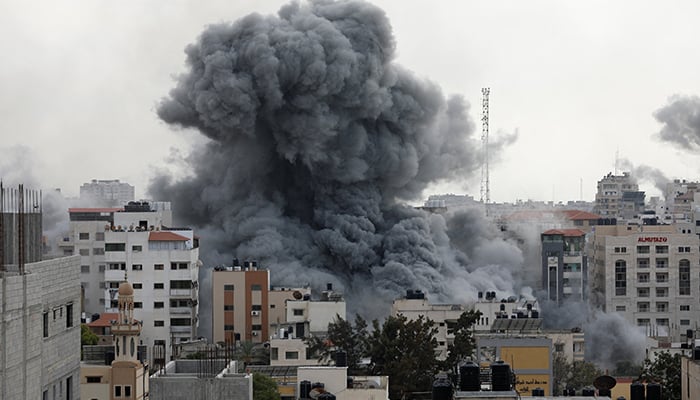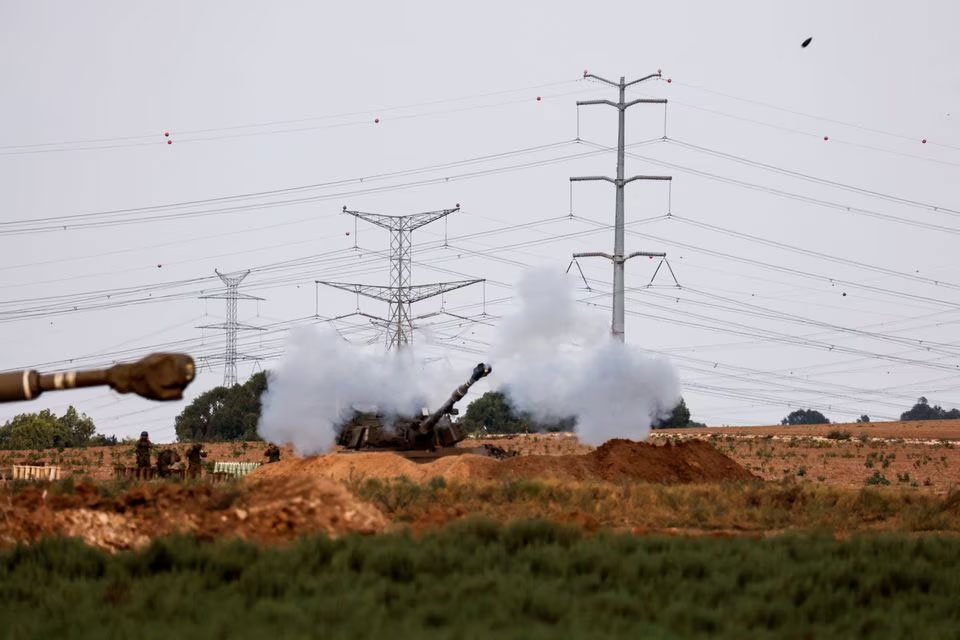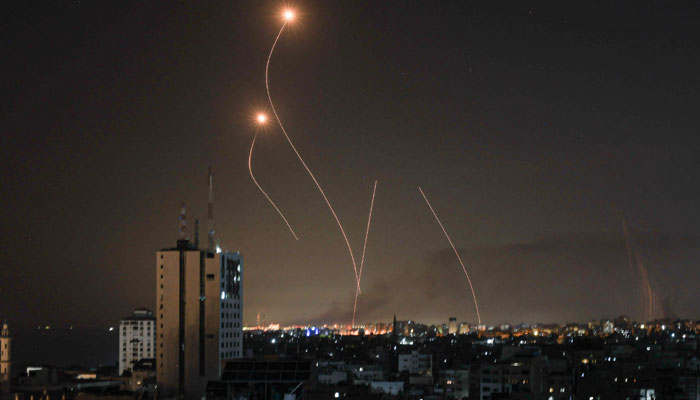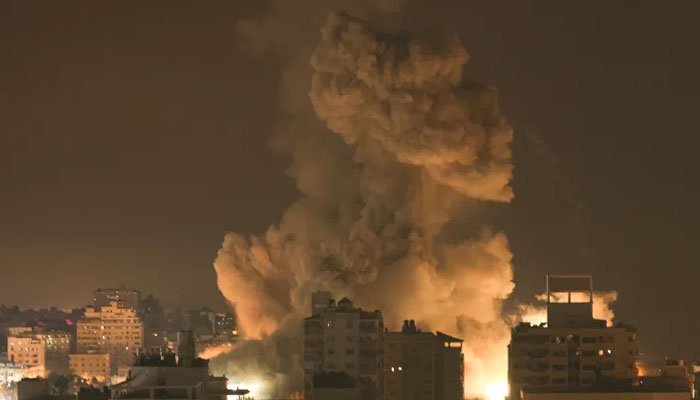Israel orders complete siege of Gaza as clashes with Hamas enter third day
Gaza officials report around 570 deaths in the impoverished and blockaded enclave of 2.3 million people
October 09, 2023

- "We have amassed around 100,000 troops," says Israel.
- More than 700 Israelis have been killed in Hamas attacks.
- Oil prices soar more than 4% over supply concerns.
Fears of ground invasion are growing as Israel is escalating measures against the Hamas-controlled Gaza Strip to a "total blockade" including a ban on admitting food and fuel.
Defence Minister Yoav Gallant on Monday described the move as part of a battle against the Palestinian group as Israel's troops were still battling on Monday to clear out Hamas gunmen more than two days after they burst across the fence from Gaza on a deadly rampage, and the army said it would soon go on the offensive after the biggest mobilisation in Israeli history.
Fighting raged at several locations inside Israel where the fighters were still holed up after killing 700 Israelis and seizing dozens of hostages in a raid that shattered Israel's reputation of invincibility.
Israel's chief military spokesperson said troops had re-established control of communities that had been overrun, but that isolated clashes continued as some Palestinian gunmen remained active.
"We are now carrying out searches in all of the communities and clearing the area," chief military spokesperson Rear-Admiral Daniel Hagari said.
Earlier, another spokesman, Lieutenant Colonet Richard Hecht, acknowledged that it was "taking more time than we expected to get things back into a defensive, security posture".
The shocking images of the bodies of hundreds of Israeli civilians sprawled across the streets of towns, gunned down at an outdoor disco and abducted from their homes were like nothing seen before in the decades-old Israeli-Palestinian conflict.
Israel has already responded with its heaviest-ever bombardment of the Gaza Strip, martyring some 576 people so far, and could be contemplating an unprecedented ground assault on the territory it abandoned nearly two decades ago.
Hagari said 300,000 reservists had already been activated in just two days.
"We have never drafted so many reservists on such a scale," Hagari said. "We are going on the offensive."
Hamas says the attack is justified by the plight of Gaza under a 16-year blockade, an Israeli crackdown in the occupied West Bank that has been the deadliest in years, and a far-right Israeli government that talks of annexing Palestinian land. Israel and Western countries say nothing justifies the intentional mass killing of civilians.
The violence jeopardises US-backed moves towards normalising relations between Israel and Saudi Arabia - a security realignment that could have threatened Palestinian hopes of self-determination and hemmed in Hamas's backer Iran.
Hamas fighters were continuing to cross into Israel from Gaza, the military said, adding that between 70 and 100 gunmen have been killed in the Beeri area since Saturday.
Fighter jets, helicopters and artillery struck over 500 Hamas and Islamic Jihad targets in the Gaza Strip overnight, with targets including Hamas and Islamic Jihad command centres and the residence of a senior Hamas official, Ruhi Mashtaa.
"The price the Gaza Strip will pay will be a very heavy one that will change reality for generations," said Defence Minister Yoav Gallant in Ofakim, one of the towns where calm was restored after a battle with Hamas fighters who stormed through it, killing civilians and leaving with hostages.
Prime Minister Benjamin Netanyahu's options for hitting Hamas, which controls the narrow Gaza Strip that is home to 2.3 million Palestinians, could be curtailed by concern for the many Israelis seized in the raid. A full-scale invasion of Gaza, which Netanyahu has tried to avoid in his long years in power, could endanger the lives of the hostages.
In a statement, the Israeli Air Force said it dropped some 2,000 munitions and more than 1,000-ton bombs on Gaza aimed at over 8,000 targets in Gaza in the last 20 hours. Among the targets were three rocket launchers directed at Israel, a mosque where militants were operating and 21 high-rise buildings that served militant activity.
Since Saturday, at least 493 people have been martyred and more than 2,750 people were wounded, said the Health Ministry in Gaza.
"The Zionist enemy's military targeting and bombing of homes inhabited by women and children, mosques and schools in Gaza amount to war crimes and terrorism," Hamas official Izzat Reshiq said in a statement.
Retired Israeli military spokesperson Lieutenant Colonel Jonathan Conricus said Israel had called up around 100,000 soldiers.
"Our job is to make sure that at the end of this war, Hamas will no longer have any military capabilities to threaten Israeli civilians with, and in addition to that we also need to make sure Hamas will not govern the Gaza Strip," he said.
Hamas's main international ally Iran congratulated Hamas on the attack, but its mission to the United Nations denied Tehran was involved in the operation. Beyond blockaded Gaza, Israeli forces and Lebanon's Iran-backed Hezbollah militia exchanged artillery and rocket fire on Sunday, while in Egypt, two Israeli tourists were shot dead along with a guide.
Appeals for restraint came from around the world, though Western nations largely stood by Israel.
He said the Israeli military will also make sure that Hamas will not be able to govern the Gaza Strip after the end of the war.
Conricus added that Israeli troops are hunting down the last Palestinian fighters who had infiltrated southern Israel.
Prime Minister Benjamin Netanyahu warned Israel on Sunday to prepare for a "long and difficult" conflict a day after Hamas launched a surprise assault from Gaza, firing a barrage of rockets and sending a wave of fighters who gunned down civilians and took at least 100 hostages.
More than 700 Israelis have been killed since Hamas launched its large-scale attack, according to the Israel Defense Forces (IDF) on Monday — the country´s worst losses since the 1973 Arab-Israeli war.
Gaza officials reported at least 413 deaths in the impoverished and blockaded enclave of 2.3 million people, which was hammered by Israeli air strikes on 800 targets ahead of what many feared may be a looming ground invasion.
Tens of thousands of Israeli forces were deployed to battle holdout Hamas fighters in the south, where the bodies of civilians had been found strewn on roads and in town centres.

"The enemy is still on the ground," military spokesperson Daniel Hagari said as a second night fell after the massive opening attack.
US President Joe Biden ordered "additional support for Israel in the face of this unprecedented terrorist assault by Hamas".
US Defense Secretary Lloyd Austin said Washington "will be rapidly providing the Israel Defense Forces with additional equipment and resources, including munitions".
Austin directed the USS Gerald R Ford aircraft carrier and group of warships to the eastern Mediterranean, and said that Washington was augmenting fighter aircraft squadrons in the region.
Hamas has said the US aid amounted to "aggression" against Palestinians.
The conflict has had a global impact, with several other countries reporting nationals killed, abducted, or missing, among them Brazil, Britain, France, Germany, Ireland, Mexico, Nepal, Thailand, and Ukraine.
A US National Security Council spokesperson confirmed that "several" Americans had been killed in the surprise attack, but did not provide further details.
Oil prices soared more than 4% Monday, sparking concerns about possible supply shocks from the crude-rich region.
Brent jumped 4.7% to $86.65 and West Texas Intermediate was up 4.5% at $88.39 in early Asian business.
Abducted to Gaza
Shock and dismay gripped Israel after at least 100 citizens were captured by Hamas and abducted into Gaza, with images circulating on social media of bloodied hostages.
Israel also came under attack from the north when Lebanon´s Hezbollah launched guided missiles and artillery shells Sunday "in solidarity" with the unprecedented Hamas offensive, without causing any casualties.
Israel responded with artillery strikes across the UN-patrolled border.

"We recommend Hezbollah not to come into this," said army spokesman Richard Hecht. "If they come, we are ready."
Israel was stunned when Hamas launched their multi-pronged offensive on Saturday, the Jewish Sabbath, with at least 3,000 rockets raining down as fighters infiltrated towns and kibbutz communities and stormed an outdoor rave where many revellers were shot dead.
"Israel was caught flat-footed by the unprecedented attack," said Jonathan Panikoff, director of the Scowcroft Middle East Security Initiative. "I´ve heard multiple comparisons to 9/11, and many Israelis are struggling to understand how this could have happened."
'No respite'
Western capitals have condemned the attack by Hamas, which Washington and Brussels consider a terrorist group.
Israel's foes have praised the assault, including Iran whose President Ebrahim Raisi voiced support when he spoke with the leaders of Hamas and the Islamic Jihad group.
Pro-Palestinian protests took place in the United States, Iraq, Pakistan and other countries, while Germany and France were among nations stepping up security around Jewish temples and schools.

In the Egyptian city of Alexandria a police officer opened fire "at random" on Israeli tourists Sunday, killing two of them and their Egyptian guide before he was arrested.
Netanyahu — who leads a hard-right coalition government but has received pledges of support from political opponents — has vowed to turn Hamas hideouts "to rubble" and urged Palestinians there to flee.
"We are embarking on a long and difficult war that was forced on us by a murderous Hamas attack," Netanyahu wrote on X, formerly Twitter.
Israeli attacks have reduced several Gaza residential towers to rubble and destroyed a mosque in Gaza´s Khan Yunis as well as the central bank.
'We will not give up'
Hamas has labelled its attack "Operation Al-Aqsa Flood" and called on "resistance fighters in the West Bank" and "Arab and Islamic nations" to join the battle.
Its attack came half a century after the outbreak of the 1973 conflict called the Yom Kippur War in Israel, sparking bitter recriminations for what was widely seen as an enormous intelligence failure.
Hamas chief Ismail Haniyeh has predicted "victory" and vowed to press ahead with "the battle to liberate our land and our prisoners languishing in occupation prisons".
Many Gaza residents voiced defiance.
"We will not give up, and we are here to stay," said Mohammed Saq Allah, 23. "This is our land, and we will not abandon our land."
UNSC fails to evolve consensus
An emergency United Nations Security Council meeting Sunday failed to unanimously take a position against Hamas, a setback to the US and Israel, as Russia and China urge the members to take a broader view of the situation to resolve the decades-long crisis after Palestinian resistance group struck heavily on Tel Aviv Saturday.
A number of members of the UN Security Council maintained their stance in favour of Israel as it suffered a massive assault but the US regretted that there was no general agreement on the issue, which indicates the delicacy of the situation.
Vassily Nebenzia, the Russian ambassador to the UN said, "My message was to stop the fighting immediately and to go to a ceasefire and to meaningful negotiations, which was told for decades."
"This is partly the result of unresolved issues," he said.













